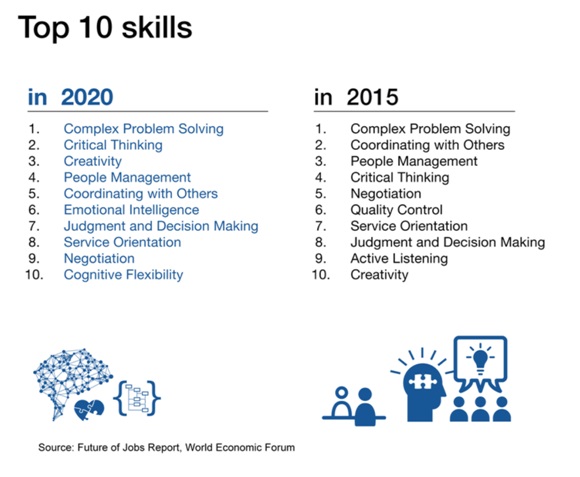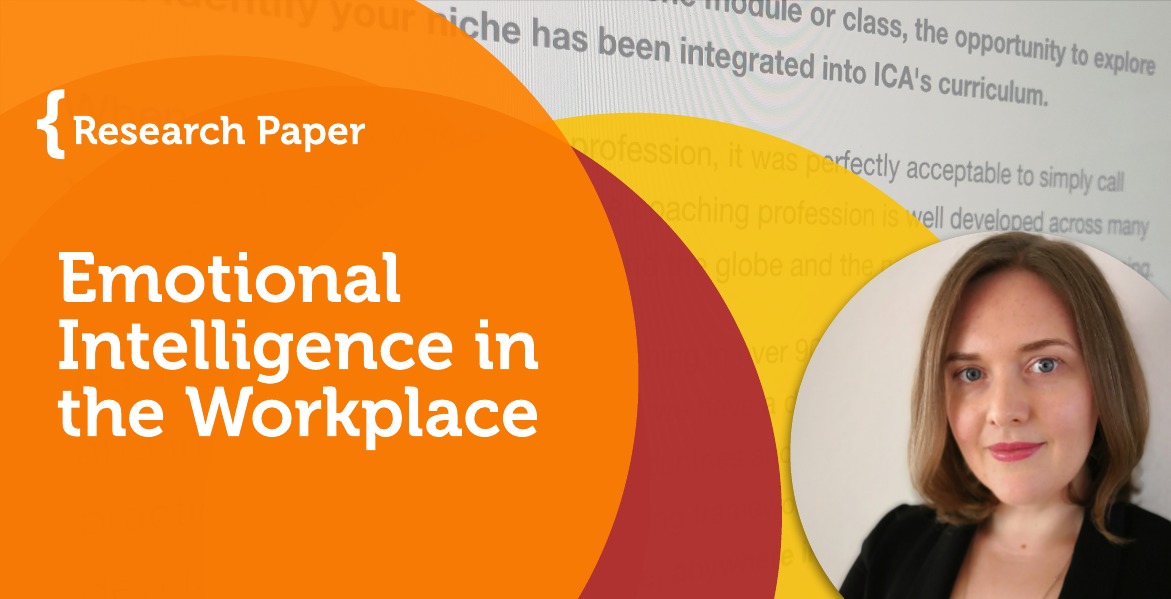Research Paper By Ildiko Benko
(Executive Coach, SWITZERLAND)

You get the best efforts from others not by lighting a fire beneath them but by building a fire within. Bob Nelson
What is emotional intelligence?
The term Emotional Intelligence (EI or EQ) was created by two researchers – Peter Salovey and John Mayer – and brought into fashion by Dan Goleman in his 1996 book of the same name. Emotional Intelligence refers to the ability to know our feelings and manage our emotions, and to recognize the feelings of others.
Emotional Intelligence revolves around the capability to balance feeling and thinking, to sense your emotion – be it good or bad – without becoming overwhelmed by it, which can cloud your judgment and affect your ability to see choices and alternatives.“These abilities are vitally important to your success since they determine how well you know your self, how well you cope with all that happens to you, and how well you deal with others. The more emotionally attuned you are to your feelings and those of people around you, the more appropriately you can respond. Responding empathetically, appropriately, and thoughtfully has important consequences in our relationships and in resolving challenges.”[1]
There’s a part of you that always knows what to do in any given circumstance, you just need to find a way to connect with that part to explore your strengths and options. EI is all about creating connections, relations, and managing energy.
Emotional intelligence in the workplace
There is no denying there has been a lot of buzz in recent years about the importance of Emotional Intelligence, as there are also countless studies and articles to prove it. Reading through these, one might ask the question but isn’t Emotional Intelligence just another fancy name for interpersonal or so-called soft skills which have been studied for decades before Goleman or even Salovey? Maybe, but this does certainly not take away its merits.
So why is it so important?
Well, because simply put learning about and practicing it can help you become a better version of yourself in every area of your life, that means in your work life too. If you are aware of your emotions, understanding them, and taking the appropriate action you are more motivated, if you are more motivated you are more productive and so on. Greater productivity leads to better results and higher potential this is why more and more companies and organizations are realizing the need for their investments in EI development for their workforce (not just for their leaders) to stay competitive.
The World Economic Forum even ranked Emotional Intelligence as one of the top 10 most important workplace skills for 2020:

As clearly pointed out in their Future Of Jobs Report, by now it is evident, the Fourth Industrial Revolution is changing not only what we do but also who we are. “It will affect our identity and all the issues associated with it: our sense of privacy, our notions of ownership, our consumption patterns, the time we devote to work and leisure, and how we develop our careers, cultivate our skills, meet people, and nurture relationships.”[2]
In the era of start-ups, even big corporations are moving more and more away from the traditional vertical organizational structures and tall hierarchies towards a more agile and more of a network type of way of working were being able to work and achieve results together by demonstrating Emotional Intelligence is key.
People with high Emotional Intelligence are more aware of themselves, better able to regulate their actions, and have more empathy for others. They can also manage stress better, build healthier relationships, be more effective at work, and more fulfilled in general. They adapt better to their environment and can change perspective, as needed. They bounce back easier from setbacks by learning from mistakes and get unstuck and move forward quicker by focusing on strengths and not weaknesses. They connect with their team’s emotions: they listen, are present, create space, use body language, which helps to solve conflicts better. Senior people (again, not just leaders) typically possess superior technical abilities; however, they often lack the skills necessary to get the best from their teams.
Why is this so important?
It is important because Neuroscience proves we humans are hardwired to connect, even introverts. Our brain will never be fully realized unless we are in a healthy group. And yet, we are not necessarily prepared to work in teams successfully at school, we have to learn it on the job. As for motivation, we are naturally motivated to seek pleasure (which may also be translated into realizing one’s ambition, accountability), and avoid pain (wish to protect). The question is how to unleash this already existing motivation in a business environment? As we know, just because somebody can do the job it does not mean they will do the job. This is where EI comes into the picture.
As Emotional Intelligence Coach, Carolyn Stern puts it: “Leadership is about inspiring, motivating, and igniting passion in others. This helps to attract and retain top talent, in addition to increasing productivity. Effective leadership can be practiced by all team members and is easily seen in the emotions of the employees within an organization.”Therefore, it is extremely important to focus on the skills of working with others to increase the effectiveness of organizations and this needs to happen right now.[3]
The technological developments will undoubtedly transform the way we live, and the way we work and CHANGE won’t wait for us: business leaders, educators, and governments all need to be proactive in up-skilling and retraining people so everyone can benefit from the Fourth Industrial Revolution.[4]
Coaching application
While it may sound counter-intuitive to tune into and focus on emotions in the workplace, as Carolyn Stern argues, it is a strong component in effectively managing in today’s diverse and demanding workplace. From a business perspective, understanding the attitudes and behaviors of your people is critical to success. After all, “it is the people, not things, which create an organization’s competitive advantage; and when you start treating people as people, it’s incredible what they can accomplish.”[5]
So how can Coaching help here?
Studies show that emotional intelligence can be learned, developed, and enhanced and regular Coaching sessions with an EI trained professional can significantly help the process.
The Institute for Health and Human Potential has listed the following areas were learning to manage EI would be critical:[6]
A quick look at this list proves, that EI development would be necessary to able to conduct daily business successfully.
Beyond of daily business, here is how EI development could also be beneficial:[7]
The list is not exhaustive and these items are certainly not easy to do, as they take time and practice. First of all, one must know oneself. What’s your goal? How do you feel about it? Your feelings may energize or slow you down if you don’t know them… Coaching may support self-assessment of one’s goals, strengths, and weaknesses, and an exploration of how to leverage these strengths more effectively to drive the best results and eventually help the Client FLOURISH not just in personal life but in a professional environment too.
Bibliography & References
Alberts, Hugo: Coaching Masterclass on Emotional Intelligence, 2019, Positive Psychology Program B.V.
https://PositivePsychologyProgram.com
Goleman, Daniel: Emotional Intelligence: Why it can matter more than IQ, 2009, Bloomsbury Publishing Plc (electronic publication)
www.bloomsbury.com/danielgoleman
Institute for Health and Human Potential: What is Emotional Intelligence? (viewed May 1, 2020)
https://www.ihhp.com/meaning-of-emotional-intelligence
International Coach Academy: Emotional Intelligence, Frameworks & Models (viewed May 16, 2019)
https://learnsite.icacoach.com/english-campus/frameworks-models-course/emotional-intelligence/
Stern, Carolyn: Why Emotional Intelligence is Important in the Workplace (viewed May 1, 2020)
https://carolynstern.com/blog/why-emotional-intelligence-is-important-in-the-workplace/
World Economic Forum: The 10 skills you need to thrive in the Fourth Industrial Revolution (viewed May 1, 2020)
World Economic Forum: The Fourth Industrial Revolution: what it means, how to respond (viewed May 1, 2020)
[1]International Coach Academy: Emotional Intelligence, Frameworks & Models
[2] World Economic Forum: The Fourth Industrial Revolution: what it means, how to respond (Jan 14, 2016)
[3] Stern, Carolyn: Why Emotional Intelligence is Important in the Workplace
[4] World Economic Forum: The 10 skills you need to thrive in the Fourth Industrial Revolution
[5]Stern, Carolyn: Why Emotional Intelligence is Important in the Workplace
[6]Institute for Health and Human Potential: What is Emotional Intelligence?
[7]Institute for Health and Human Potential: What is Emotional Intelligence?
